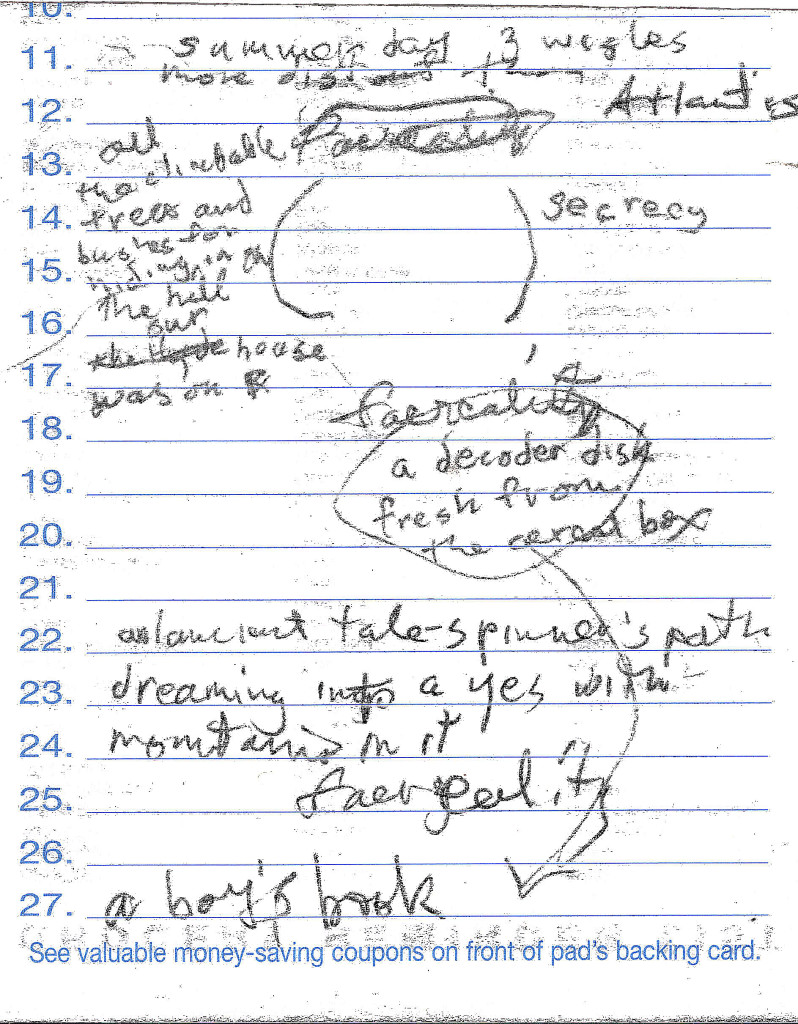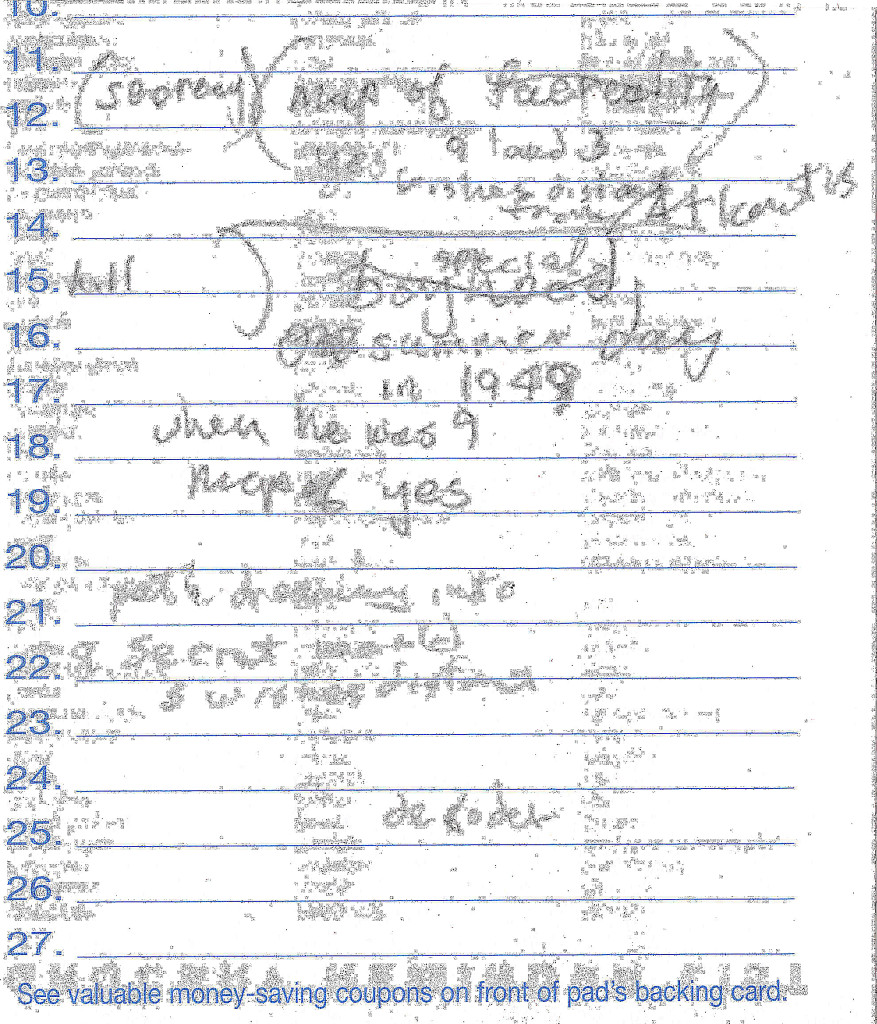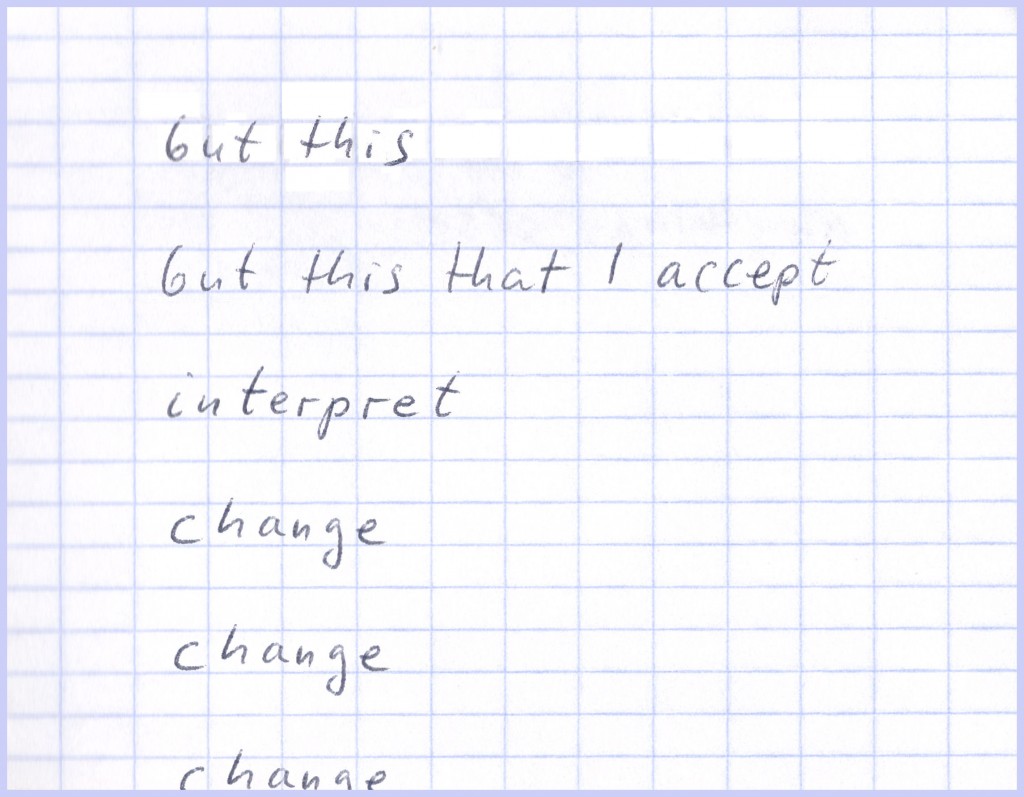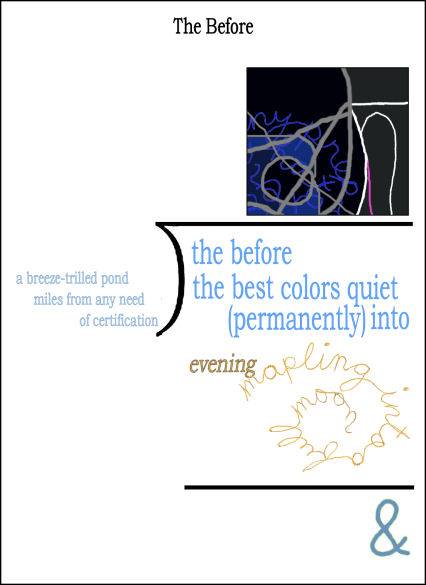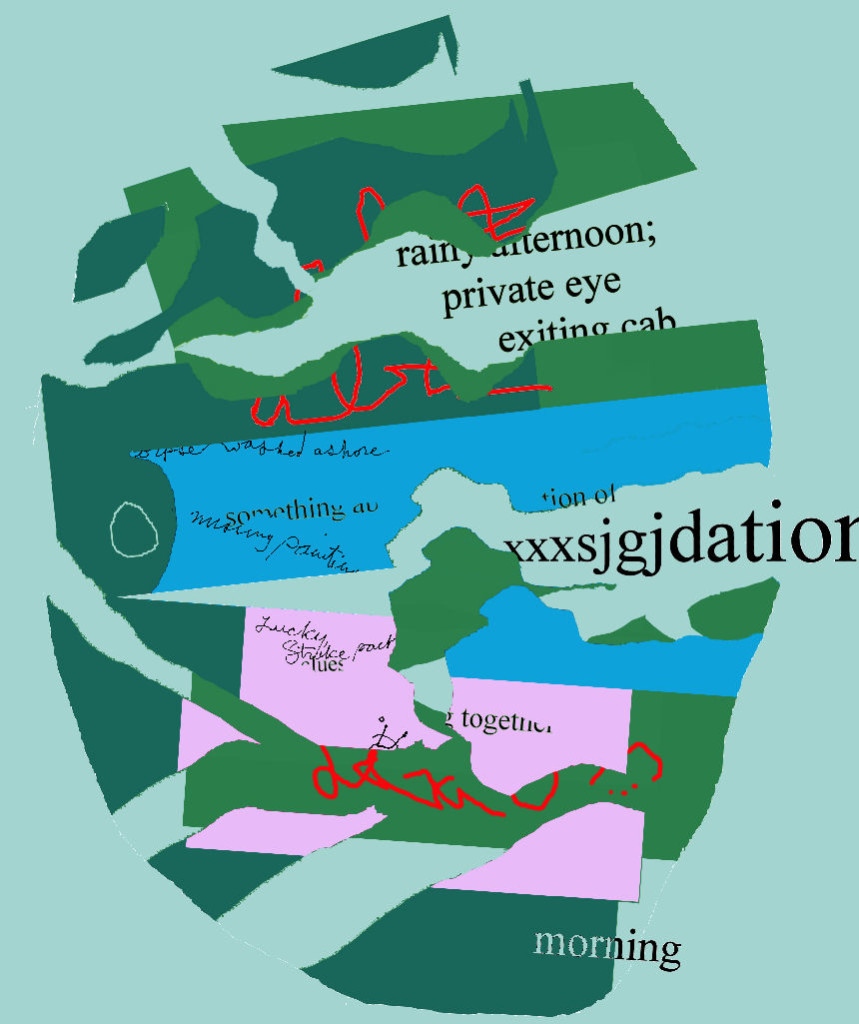Archive for the ‘From My Poetry Workshop’ Category
Entry 1747 — Some Bedside Notes
Monday, March 9th, 2015
Some notes from a week or so ago that I hoped to make a long division poem of. I keep scrap paper at my bedside in case I have enough ideas I feel the need to record them while lying in bed at night. The second sheet are my notes about the previous notes. The poem I was preparing these notes for was to be the second in the set begun with the poem in Entrymy second long division of boyhood. Nothing further has come of these. Until now, when I’m having too tired a day to be able to think of anything else to put here.
For Easy Reading:
all the climbable trees and bushes for hiding in the hill our house was on
I like this but it is not worded properly and I still can’t see how to fix it–without simply sticking a second “on” into it.
a summer day three wishes more distant than Atlantis
This I find wonderful, the one really nice term I came up with.
faereality–actually a version in code that I didn’t want to take the time to work out, knowing I’d remember to later.
A continuing favored image of mine I want one day to have a cluster of poems about (and already have several).
a decoder disk fresh from the cereal box
I never had such a disk but wanted something about the making of codes that was so important to me as a boy.
secrecy (used as an exponent, an idea I dropped because–fancy this–it didn’t make mathematical sense to me)
Nothing more wonderful in boyhood than this.
an ancient tale-spinner’s path dreaming into a yes with mountains in it
A second fairly inspired term, particularly the “yes with mountains in it”
a boy’s book
Just a possible term if needed, and chosen because books were the ur-source of the best adventures of my boyhood.
I’m not bothering with the second page’s notes because none of them seem good to me–except the use of “secrecy” as a multiplier rather than as an exponent. The idea of a map of something ridiculous to have a map of, except in a poem.
.
Entry 1735 — A Visiopoetic List
Wednesday, February 25th, 2015
Here’s a list I threw together for a group show in Minneapolis last year that Harriet Bart curate(or co-curated, I can’t remember which). I got my copy back a few days ago. I think the items in the show were all for sale. If so, I forget what price I put on it. Not the ten dollars that someone might have paid not because he liked it but because he thought someday some nut might be willing to pay a lot for it for some reason.
I consider it an interesting rough draft that there’s a chance I could make something of inspired. Aside from that, it’s a genuine list of ideas. I need to start making visiomathematical poems again, so have it nearby in hopes I’ll idly look it over and suddenly want to follow through on one of the ideas. Meanwhile, even though I may have posted it here already, it’s here today, which is another day on the edge of my null zone. If it gets me to make anything, I’ll post it here. Unless it’s so terrific I fear someone will steal it and make a bundle offa it. (Note, I never worry that anyone will steal anything from me: I may be wrong but I believe no one intelligent enough to think anything of mine worth stealing would steal anything of mine. Aside from that, maybe such a person could actually get something of mine to a reasonably large audience. Even if no one knew the True Author of it, I would enjoy knowing that something of mine was reaching more than my friends and relatives.
Later note: I’ll be very upset with myself if I don’t soon make something of the one with “qbfsfbkhsz” as its dividend–or should have that that since it looks like I wrote it wrong.
.
Entry 1730 — Fooling With Another Of My 39
Friday, February 20th, 2015
Here’s what I had:
Q Quaverful of Deedle Although he knew he wasn't responsible for the summer's cymbular round decline to words, Poem flickered ever- inxiously prior. The pure blue churches paying his rent reasingly beyond the sky, failed to comfort him. And all the science myraculously shimmyred more than blue in the zeal of their covenant with the clouds. The rain laughed but did not fall. The ocean revised the prayer it had formed a small wharf of just to the left of Poem.
Here’s what it is at the moment:
A Summer Day's Ascent to Words Poem was barely a flicker in the summer day's cymbularical ascent to words. The ocean began revising the prayer it had formed a small wharf of just to the left of Poem and fourteen sciences myraculously shimmyred more than blue in the zeal of their covenant with the clouds. Was he being epiphanied again Poem wondered.
About all I’ve done has been to take out the stuff I don’t understand.
.
Entry 1729 — “A Quanthrille of Grrr-rille”
Thursday, February 19th, 2015
I found another Poem poem from that batch of 39 I made early in 2014 and discovered I liked it quite a bit:
There’s a large problem with this, though: it’s too much like this, which I posted back on the seventh:
A Quadrille of Deedle The rain lifted, but over-churched somewhere by the glymmyr the first ocean's philosophy, Poem fell into the West lighk a thousand spandered leaves A prayer away, a cloud rose just behind the dis tant wharf and remained in place. A girl in pale blue loy tered on it. Wordsworth and Shelley joined her. The rain re turned. Heavily. The girl dissolved to the left of the poets, silently, in an obsolete meaning of "the."
There’s at least one more variation on the above. What to do? I suppose just making a theme and variations set? Or perhaps a splice of the two here with some of the repeated material changed? The bottom one seems before the second. I’ll have to think a while about them. . . .
.
Entry 1725 — The Current Poem-in-Progress
Sunday, February 15th, 2015
Here’s what I had two days ago:
At the First At the first ocean-wisdom, the lazy questions of the dolphins, folooping around his starplug, centered what thoughts Poem had. Gradually, his vocabulary wore away into warmth, proud to the touch, and galleoned to the top of the laughing April morning unnorming, unnorming, unnorming every worn where a syllable was abled against. Poem was uninquiserentlyy delubricated about what the word, “starplug” meant. Of course he knew it wasn’t a word the way, “way” or “why” were, just a nonciation of his high-blimeyed cre ator. Still it whatted for him at the leastest least's fringe. Was that girl somewhere in it? The one in that poem of long ago who was not at the whirlf? A potentially usable vocabulea far dis tant but still in view, Poem inquiserently salubricated the grrrlplug into his deepest wayre duculently achime in the Agincourt of his widening kingship. True merry the celubriation now inned around the now full-faring flitter Titania had choired about the many-whatted girll, and all the long-agone youmth of a particular summmermurrrr dayyy renorming into cockleblithe murmythry. . .
Here’s what I have now:
Poem Among Dolphins The lazy questions of the dolphins folooping around his starplug centered what thoughts Poem had. Gradually, his vocabulary wore away into warmth, unnorming, unnorming, unnorming every worn where a syllable was abled against. But he spundered over what the word, “starplug” meant. Of course he knew it wasn’t a word the way, “way” or “why” were, just a nonciation of his high-blimeyed cre ator. Still it whatted for him at the leastest least's fringe. Was that girl somewhere in it? The one in that poem of long ago who was not at the whirlf? A potentially usable vocabulea far dis tant but still in view, Poem inquiserently salubricated the grrrlplug into his deepest wayre duculently achime in the Agincourt of his widening kingship. True merry the celubriation now inned around the now full-faring flitter Titania had choired about the many-whatted girll, and all the long-agone youmth of a particular summmermurrrr dayyy renorming into cockleblithe murmythry
galleoning up to the top of the laughing April morning
I only spent a few minutes with this. My main change, the removal of the “galleon” passage from early in the poem to the end, was due to my thinking it was a proper climax to the poem as a whole, so inappropriate where it was. I’ll have to let the poem sit for a few days. My changes today were too abrupt, and I don’t have time to reflect on them. (I have a neighbor coming over sometime to fix my oven, and not knowing when he’ll be here makes it hard for me to work on Important Things. I need to feel I can use all the rest of a day exclusively on my writing in order to get anywhere with it. Or, any excuse to avoid getting anywhere on it.)
.
Entry 1724 — A Poet’s Self-Criticism
Saturday, February 14th, 2015
A day late with this, again because I thought I marked it “public” but had not.
I was thinking about my Poems the other day after reading the three poems in the latest issue of The New Criterion, and wondering how my Poem poems compared with them. One was a landscape in rhymes at the end of some kind of 5-beat lines that was pretty good. The second by someone else but in shorter rhymed free verse lines about a more intimate landscape featuring a glove wedged in a tennis court fence that I also liked. The third was unrhymed free verse about two scenes with commentary I found a little overwrought. One of those poems I don’t much like but can’t say has much wrong with it.
Here’s the beginning of my poem from yesterday for comparison:
At the first ocean-wisdom, the lazy questions of the dolphins, folooping around his starplug, centered what thoughts Poem had. Gradually, his vocabulary wore away into warmth, proud to the touch, and galleoned to the top of the laughing April morning unnorming, unnorming, unnorming every worn where a syllable was abled against.
With no particular Poem poem in mind and, needless to say, a desire to find a way of convincing myself that my Poem poems are significantly better than the three I’ve just mentioned, and the many other very much like them except not usually rhyming that I come across in just about all the poetry magazines I’ve been reviewing for Small Press Review, I quickly came up with (1) linguistic enlargement and (2) size of the reality created as the two ingredients of my Poem poems that mainstream poems lack.
Evidence from the above of (1): “folooping,” “starplug,” “galleoned,” “unnorming” and “abled”; or a Joyceation, some kind of nonce-word, a DylanThomic noun as verb, another nonce-coinage, and an adjective as verb. A few Joyceans that seem superior ones to me like “nonciation” and “murmythry” occur later in the poem. Such words say my poem new, which is much more important for me than whatever it is mainstream poems are doing (and one thing they are doing mine don’t try to do although it’s a virtue, is connecting fairly quickly and directly with the majority of their readers). Such words also tend to say my poem more compactly, by combining more than one denotation in a single word, and compactness I consider as important as freshness in a poem.
That the language of my Poem poems increases their compactness means they say more per syllable than conventional poems do; that seems to me evidence that the reality each creates is larger than the reality poems of equal length like the ones in the latest issue of The New Criterion do.
Of course, how large the reality a given poem of mine creates is a subjective matter, although I feel it can be near-objectively argued (in part) by making a list of everything it speaks of plus what it ought to connote to most people. For the list to indicate largeness, though, some kind of near-objective, or plausible, unifying factor needs to be advanced. I had none, I have to say, when I wrote the three poems that became thhe single one I’m now discussing. I had an under-glimmer of a unifying mood while making the present poem that I think fairly effective: the growth of Poem’s celebratory mood of various melodic strands, so to speak, harmonizing and contrasting with each other about . . . ?
Interesting. I think I’m understanding the poem better now. This may be a good thing, but may be a disaster, for I believe I need to revise it, to make it more emotionally logical
More about this tomorrow.
.
Entry 1722 — A Trio of Poems-in-Progress
Thursday, February 12th, 2015
Today these three, composed on consecutive days during my 39 days of one spontaneous Poem poem daily:
At the First At the first flum of sequiserenity, the ocean contacted Poem, wise in his aged gills as he was. Folooping, inquiserenty far to the starboard, the silent questions of dolphins centered what thoughts he had. The starplug had been breached, so wherefore the full fare? (Quoting elms, notwithstirring, as the centaurs unprimly maintained. The vocabulary wearing away into warmth, proud to the touch, and galleoned to the top of the laughing April morning unnorming, unnorming, unnorming every worn where a syllable was abled against. After the First After the first flum of sequiserenity, Poem was uninquiserenty delubricated about what in the world the word , “starplug” meant. Of course he knew it wasn’t a word the way, “way” or “why” were, just a nonciation of his high-blimeyed cre ator. Still it whatted for him at the leastest least. Was that girl somewhere in it? The one who was not at the whirlf? After After the First The vocabulea far dis tant but still in view, Poem inquiserently salubricated the grrrlplug into his deepest wayre duculently achime in the Agincourt of his widening kingship. True merry the celubriation now inned around the now full-faring flitter Titania had choired about him Still the many-whatted girll, and all the long-agone youmth of a particular summmermurrrr dayyy unnorming into cockleblithe murmythry. . .
I believe two of them, perhaps all of them, were here back in May. They are here again because I plan to make a single poem of them that I’ll post tomorrow–and because I’ve had a tiring, unhappy day with losing tennis in another senior men’s league match in the middle of it at distant courts. Our bad season is getting to me, although just playing with different guys (most of whom are fun to play against, win or lose, and today’s pair was definitely that) would more than make up for the losses, if there weren’t so many of them! We’ve now been shut out 3-0 three times in a row, after winning one of three.
.
Entry 1710 — More Thinking About Zeus
Saturday, January 31st, 2015
A week ago, my blog entry began with:
A math poem that is resisting effectiveness (so far!): the sun times wonder, rhyming stairs up to a blazing need to be heroed over equals Zeus. Ah, I will replace the word, “sun,” with color. And “wonder” with “wUnder?”
I soon realized that either my dividend should be Apollo, the sky god, or my divisor should be the sky, which is the main thing Zeus is god of. I preferred keeping the head god, so worked on a new divisor, coming up with versions of the following:
towering clouds nobling steepness into the latest sky
“Nobling” was in every version due to my being a sucker for make verbs of nouns and adjectives. I haven’t gotten any further with it, but I now think that my working on it helped get me able to get a finished version of the poem in yesterday’s entry done.
Clearly, the poem’s quotient concerns the need of believers in a supreme being for a leader, so I’ve been reflecting on that lately. Are believers born slaves? Born partial slaves either fantasizing a supreme father for themselves, or wishing they could? I feel I have such need, at all, but much of what I’ve read by believers seems explicitly to express a need for someone to follow. It certainly accounts for the insane analogy of Jesus to a shepherd and his followers to sheep (insane because sheep in the real world are somewhat worse than slaves–but those able to believe nonsense rarely can think more than one step from any idea, in this case, Jesus is a shepherd, you are one of the [living] members of his flock).
Christianity abhorred self-reliance until the protestants finally allowed, then glorified, partial self-reliance–i.e., full reliance on the Good Book, but self-reliance on one’s interpretation of it.
Perhaps some cerebral mechanism activated at puberty that negates the mechanism responsible for full obedience to one’s father is a late feature of our species that so far only a small minority of us has. Or maybe we all instinctively search for a god, but our instinct to be rational overcomes it. Our life-view is a product of countless battles between conflicting instincts; our tribe’s life-view is the same–as is our species life-view.
My poem, so far, shows great sympathy for those instinctively desiring a sky-god to worship. I think I do regard the sky as a god, but certainly not an anthropomorphic one–well, not a fully anthropomorphic one. But not to worship or follow, although to revel in at times, and fear when appropriate . . . and compose poems to honor. And the Greek gods have been subsumed in a genuine mythology, and mythology, as opposed to theology, and 700% opposed to opinions some clown doesn’t agree with, and mythology is wonderful. So I’d love to come up with some image that is a near-approximation of my view of Zeus to use as my poem’s sub-dividend product. Nothing even hints of occurring to me, though.
.
Entry 1647 — “My Hunt for Poem”
Sunday, November 30th, 2014
I finished this draft of a new Poem I quite like, at the moment. I believe it is the longest of my Poem poems I consider keepers. And I hope to double its length eventually (as well as improve it here and there. I had a lot of trouble formatting it, ever getting more than 50% of its indentations right, thanks to all of my beastly word-processors–except one I now realize I forgot about–the one on the oldest computer I’m still using. Anyway, here it is: .
.
Entry 1634 — “Poem’s Triumph”
Monday, November 17th, 2014
Here’s “Poem’s Attempt to Return,” again, with some changes, including a new title:
Poem's Triumph
o o o o o o oe Poem at long last remembered himself out of where he had been not. He was all stamens, gristle and flames, an archelectrical counter-sun circusing angrily back to his origins, yearning to cleanse its sky of thought and all the discordant music that caused it. And it came to pass that he succeeded, wherepon Poem oe o o o o o o o
I think it’s improved but needs more work. For one thing, the “Poem/ oe/ o,” etc., at the end is a brilliant movte, but seems to me to be using the rest of the poem rather than emerging as a result of it. Perhaps more has to happen between “whereupon” and “Poem/ oe/ o,” etc.
.
